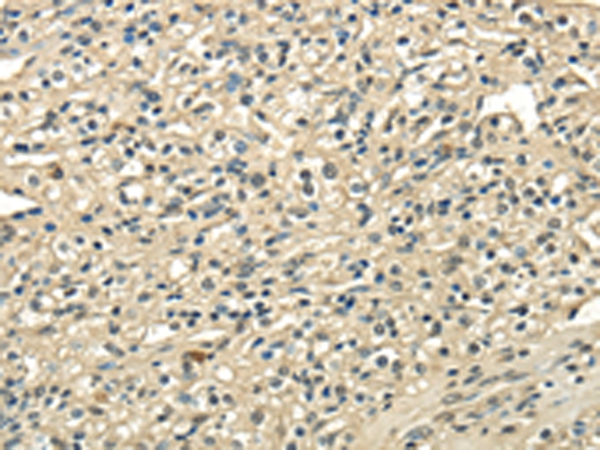
| WB | 咨询技术 | Human,Mouse,Rat |
| IF | 咨询技术 | Human,Mouse,Rat |
| IHC | 1/25-1/100 | Human,Mouse,Rat |
| ICC | 技术咨询 | Human,Mouse,Rat |
| FCM | 咨询技术 | Human,Mouse,Rat |
| Elisa | 咨询技术 | Human,Mouse,Rat |
| Aliases | UBP |
| Entrez GeneID | 7398; |
| Host/Isotype | Rabbit IgG |
| Antibody Type | Primary antibody |
| Storage | Store at 4°C short term. Aliquot and store at -20°C long term. Avoid freeze/thaw cycles. |
| Species Reactivity | Human |
| Immunogen | Fusion protein of human USP1 |
| Formulation | Purified antibody in PBS with 0.05% sodium azide. |
+ +
以下是关于USP1抗体的3篇参考文献及其摘要概括:
1. **文献名称**:*"Regulation of the Fanconi anemia pathway by ubiquitin-specific protease 1"*
**作者**:Nijman SMB, et al.
**摘要**:本研究揭示了USP1通过与FANCD2去泛素化调控范可尼贫血(Fanconi anemia)通路的关键作用。利用USP1抗体进行免疫沉淀和Western blot实验,发现USP1缺失会导致FANCD2持续泛素化,进而影响DNA交联损伤修复。
2. **文献名称**:*"Targeting USP1-dependent DNA repair in osteosarcoma"*
**作者**:Mistry H, et al.
**摘要**:通过USP1抗体检测骨肉瘤细胞中USP1蛋白表达水平,研究发现USP1抑制剂可增强化疗药物顺铂的敏感性,表明靶向USP1可能为骨肉瘤治疗提供新策略。
3. **文献名称**:*"USP1 deubiquitinase: cellular functions and therapeutic potential in cancer"*
**作者**:Garcia-Santisteban I, et al.
**摘要**:综述了USP1在DNA损伤应答和癌症中的功能,强调其实验中使用的USP1抗体在解析蛋白互作网络(如与PCNA的结合)中的关键作用,并探讨其作为治疗靶点的潜力。
(注:若需补充更多文献,可进一步提供方向或具体研究场景。)
The ubiquitin-specific protease 1 (USP1) is a deubiquitinating enzyme that plays a critical role in maintaining genomic stability by regulating DNA repair and replication processes. It primarily acts on substrates like PCNA (Proliferating Cell Nuclear Antigen) and FANCD2 (Fanconi Anemia Group D2), removing ubiquitin modifications to control their activity. USP1 is particularly associated with the Fanconi anemia pathway and homologous recombination repair, making it essential for resolving DNA interstrand crosslinks and mitigating replication stress. Dysregulation of USP1 has been linked to cancer, as its overexpression is observed in osteosarcoma, ovarian cancer, and other malignancies, often correlating with chemoresistance and poor prognosis.
USP1 antibodies are essential tools for studying its expression, localization, and interaction networks. They are widely used in techniques such as Western blotting, immunohistochemistry, and immunofluorescence to investigate USP1's role in DNA damage response and repair mechanisms. Researchers also employ these antibodies to explore therapeutic targeting of USP1. as inhibiting its activity (e.g., via small molecules like ML323) may sensitize cancer cells to DNA-damaging therapies.
High-quality USP1 antibodies are validated for specificity and sensitivity, often through knockout cell lines or siRNA knockdown controls. Their applications extend to both basic research and preclinical studies, providing insights into USP1's regulatory mechanisms and potential as a biomarker or therapeutic target in oncology.
×